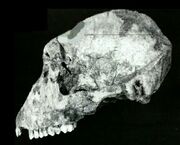(Adding categories) Tag: categoryselect |
No edit summary Tag: rte-source |
||
| Line 1: | Line 1: | ||
| − | Homodon[[File:Homodon_skull.jpg|thumb|A skull of a homodon that lived during the early Pleistocene and was one of the last homodon in existence.]] (name meaning man teeth), formerly known as Prodylanus (name meaning first dylanus, until people realized the bones were too different to be that of early dylanuses), is an extinct mammal species that was the direct descendant of [[lutonsotherium]] and the direct ancestors of all [[Dylanus|dylanuses]]. It was the last dylanusid species to evolve before they evolved into dylanuses (including modern dylanuses. It resembled a hybrid between an orangutan (an ape), a black bear, and a modern dylanus. It was a much more specialized bipedal walker and runner than the earlier lutonsotherium, but wasn't as good at walking or running on hind legs as modern dylanuses as their leg bones and ribs suggests, so homodon was more likely happy on both hind legs and all legs. It was also more omnivorous than the earlier lutonsotherium, able to feed on insects, fruit, small reptiles, eggs, and smaller mammals. It survived much longer from competition by already evolving wild dogs (including gray wolves) unlike lutonsotherium, but it eventually became extinct due to competition and being preyed on by bears that arrived from Asia and into North America. |
+ | Homodon[[File:Homodon_skull.jpg|thumb|A skull of a homodon that lived during the early Pleistocene and was one of the last homodon in existence.]] (name meaning man teeth), formerly known as Prodylanus (name meaning first dylanus, until people realized the bones were too different to be that of early dylanuses), is an extinct mammal species that was the direct descendant of [[lutonsotherium]] and the direct ancestors of all [[Dylanus|dylanuses]]. It was the last dylanusid species to evolve before they evolved into dylanuses (including modern dylanuses). It resembled a hybrid between an orangutan (an ape), a black bear, and a modern dylanus. It was a much more specialized bipedal walker and runner than the earlier lutonsotherium, but wasn't as good at walking or running on hind legs as modern dylanuses as their leg bones and ribs suggests, so homodon was more likely happy on both hind legs and all legs. It was also more omnivorous than the earlier lutonsotherium, able to feed on insects, fruit, small reptiles, eggs, and smaller mammals. It survived much longer from competition by already evolving wild dogs (including gray wolves) unlike lutonsotherium, but it eventually became extinct due to competition and being preyed on by bears that arrived from Asia and into North America. |
<div style="float:right;"> |
<div style="float:right;"> |
||
Revision as of 23:26, 1 August 2017
Homodon

A skull of a homodon that lived during the early Pleistocene and was one of the last homodon in existence.
(name meaning man teeth), formerly known as Prodylanus (name meaning first dylanus, until people realized the bones were too different to be that of early dylanuses), is an extinct mammal species that was the direct descendant of lutonsotherium and the direct ancestors of all dylanuses. It was the last dylanusid species to evolve before they evolved into dylanuses (including modern dylanuses). It resembled a hybrid between an orangutan (an ape), a black bear, and a modern dylanus. It was a much more specialized bipedal walker and runner than the earlier lutonsotherium, but wasn't as good at walking or running on hind legs as modern dylanuses as their leg bones and ribs suggests, so homodon was more likely happy on both hind legs and all legs. It was also more omnivorous than the earlier lutonsotherium, able to feed on insects, fruit, small reptiles, eggs, and smaller mammals. It survived much longer from competition by already evolving wild dogs (including gray wolves) unlike lutonsotherium, but it eventually became extinct due to competition and being preyed on by bears that arrived from Asia and into North America.
| Homodon |
|---|
|
